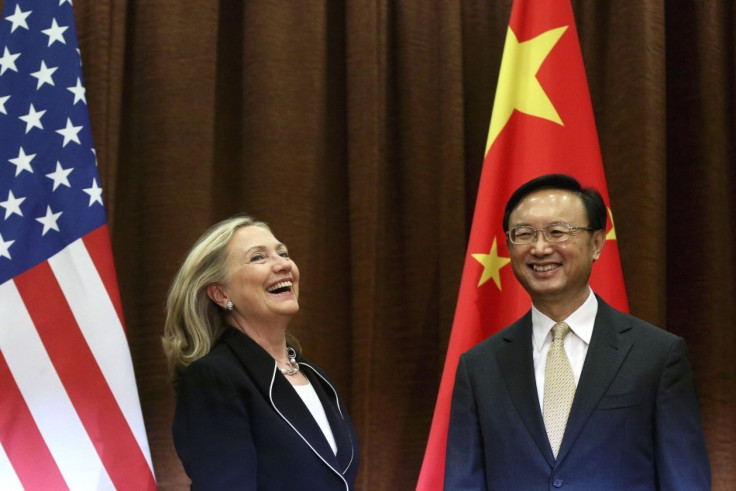Clinton's China Trip Reveals A Litany Of Disagreements

Four months ago, when U.S. Secretary of State Hillary Clinton was visiting China the first time this summer for the bilateral Strategic Dialogue, she was greeted by adorable, smiling school children and offered a tour of national museums.
This time around, national newspapers in China blasted Clinton and the Obama Administration for what they said was organizing a ring of containment around China in the South China Sea, meddling in Asia's regional affairs for American self-interest in a destabilizing fashion, and siding with others against China in regional territorial disputes.
Back in early May, bilateral negotiations seemed more conciliatory: both countries were intent on focusing energies on their economic relations, financial adjustments, and balancing two-way trade. China watchers were eager to point out that touchy issues, like human rights, including an incident involving dissident Chen Guangcheng's arrival in the U.S. embassy in Beijing, were quickly glossed over and sidelined.
Clinton's trip to Asia, including the Tuesday and Wednesday meetings with Chinese officials in Beijing, was originally also meant to highlight economic and trade issues, mostly revolving around the Asia-Pacific Economic Cooperation organization.
Instead it now appears to be dominated by a slew of disagreements between how Beijing and Washington see their own and each other's roles in the world.
That litany of different perspectives does not simply cover problems China has in the South China Sea with the Philippines and Vietnam, it also includes territorial disputes in the East China Sea with Japan, differences between how Washington and Beijing see the worsening situation in the Middle East, and how to handle nuclear North Korea.
The State Department said last Thursday that the trip would certainly cover island disputes in the South China Sea, "but it's going to be a broad, wide-ranging discussion with the Chinese about all of the key issues that we always talk to the Chinese about."
But it seems like there's little consensus on those other key issues, either.
More recently, reports in the Western press have detailed how Chinese banks have allegedly funneled money to Iran in spite of international sanctions. The U.S. originally held up the prospect of sanctioning foreign companies that traded with Iran in late 2011, only offering an exemption for Chinese groups very near the late-June deadline to demonstrate decreased trade with Tehran.
China has also offered North Korea a strengthening of economic relations in August, while the U.S. hardened its stance in dealing with the North after its rocket launch in April. The U.S. suspended food assistance to the country in protest for the event, which it called a ballistic missile test, back in spring 2012. Within a week after a major military parade in Pyongyang, U.S. military analysts were crying foul about China, saying missile carriers (but not the missiles themselves) used by the North came from the regime's backers in Beijing.
On Syria, China has voted consistently with Russia to prevent sanctions and even harsher tones from the United Nations Security Council against the regime of Bashar al-Assad. It says it opposes any foreign intervention in the country, on principle. The Obama administration, on the other hand, is being pressured at home and abroad by activist groups and politicians to lend more assistance to the Syrian opposition beyond the current offer of humanitarian assistance (and widely suspected provision of intelligence). It is thought that Secretary Clinton has already raised the idea of enforcing a joint no-fly zone over portions of Syria with some NATO partners, including Turkey.
Yet it is perceptions of the U.S. position on China's ongoing dispute with Japan that have probably created the most friction. Thousands of Chinese protestors turned out across the country in mid-August after the Japanese coast guard arrested Chinese nationalists from Hong Kong who planted their flag onto a disputed island in the East China Sea. Later landings by Japanese nationalists stoked tempers even further.
The State Department noted last Thursday that "the U.S. does not take a position on the question of the ultimate sovereignty of the Senkaku Islands. We expect the claimants to resolve the issue through peaceful means among themselves. That's the U.S. position. We've said it once. We'll say it again. That's very clearly our position."
However, China is upset that the U.S. refers to the islands as the Senkakus, by their Japanese name, rather than the Diaoyu Islands, as they are predominantly known in the Chinese speaking world. It is also angry that the U.S. says the islands are covered under its defense treaty with Japan, which it sees as Washington's implicit recognition of Japanese ownership.
Speaking on disputes in the South China Sea, Clinton said on Tuesday that it applauded any efforts by ASEAN and China to create a code of conduct on behavior in the resource-rich body of water, vital to international shipping and trade. Clinton said the U.S. would "encourage ASEAN and China to make meaningful progress toward finalizing a comprehensive code of conduct in order to establish rules of the road and clear procedures for peacefully addressing disagreements."
In response, China's Foreign Ministry said on the same day that it hoped "they [the U.S] will keep their promise and do more to help stability and not the opposite. The South China Sea dispute is a complicated thing. To China, the South China Sea dispute is about the sovereignty of some of the islands there. China, like other countries in the world, has the obligation to safeguard its territories."
© Copyright IBTimes 2025. All rights reserved.





















